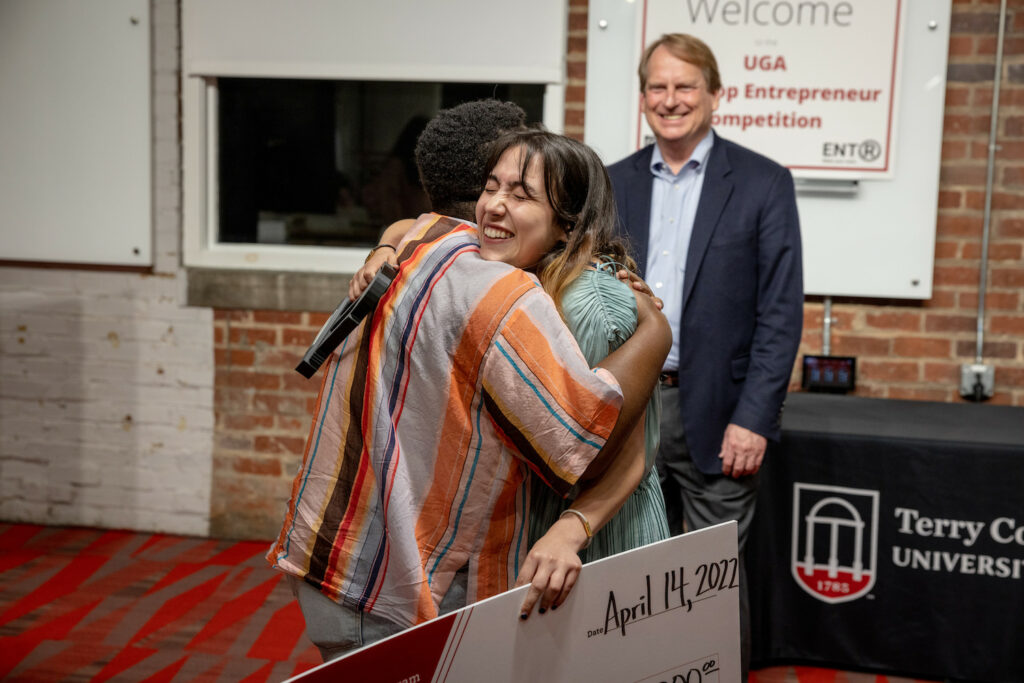It begins with an idea.
Specifically, an idea designed to solve a problem — something that fills a consumer need.
Then comes customer discovery — do others see value in the solution? Once product-market fit is verified, then comes pitching. Lots and lots and lots of pitching — selling the idea to anyone who might be willing to help financially or otherwise.
Then there’s the business plan creation, market research, legal structuring, manufacturing, sales, scaling up…
In short, being an entrepreneur involves a ton of work, often for little payoff; more than half of startups fail within five years. But so much hinges on the strength of the idea, and companies with marketable ideas who make good products and grow smartly can enjoy lasting success.
The companies that grew out of the UGA Entrepreneurship Program since its formation eight years ago have been successful, indeed.
“We estimate that 55 to 60 percent of companies that win one of our accelerator competitions are still in business five years later,” says Bob Pinckney, UGA’s Milton Anthony (Tony) Greene Director of Entrepreneurship and a senior Terry lecturer who launched the campus-wide program in 2015.
Housed in the Terry College and open to the UGA community, the Entrepreneurship Program offers many entrance points to participation, including a popular certificate program, an idea workshop, pitch contests and a student-led venture fund. Students and faculty with a business idea can take advantage of mentorship, seed funding and other resources.
For Pinckney (BBA ’82), the program is a continuation of his entrepreneurial journey. After stints in real estate and investment banking, he founded a string of software and communications businesses before becoming CEO of EvoShield, growing the sports apparel company from a small enterprise to a major player in its industry.
“Starting the Entrepreneurship Program was a good opportunity to come back and give back to UGA,” says Pinckney, “to be an entrepreneur in a big organization and create something that didn’t exist. That’s been the fun thing: being able to put something together and watch it grow.”
The program has grown. The first year, Pinckney recalls, “I had one class of about 33 students. Today we have more than 400 in the certificate program.” In 2019 the program opened a shiny new home, Studio 225, a modern, collaborative learning and maker space in downtown Athens.
There, students converge to develop ideas, learn from innovators, share advice and secure funding. By and large, they are driven by a common goal: creating the next big thing.
Shaking up skin care
Kristen Dunning never thought she would start a business. Until she encountered the Entrepreneurship Program, she didn’t think much about business at all.
“My dream job was to be a product formulator or a cosmetic chemist for a natural products company,” says Dunning (BSA ’21), the founder of natural skin care brand Gently Soap. “I always said (working for) Burt’s Bees was my dream.”
As a student in the College of Agricultural and Environmental Sciences, Dunning drew on her family’s background in agriculture to study the healing properties of medicinal plants. Inspired by a traumatic childhood battle with eczema, she dreamed of creating bathing products for people with sensitive skin.
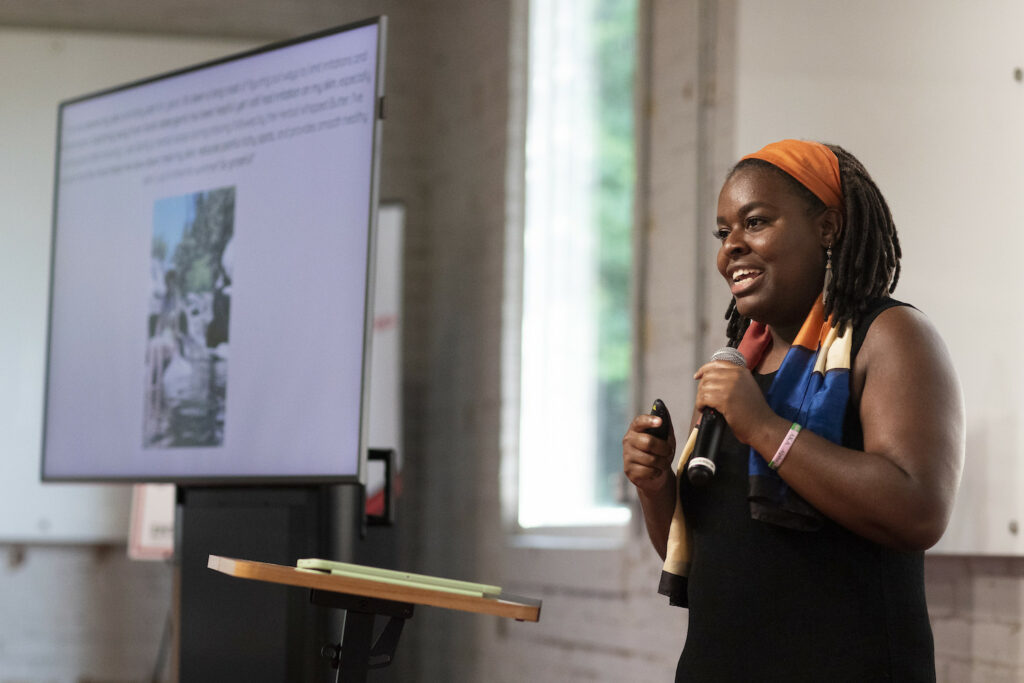
After developing a new way to infuse plant materials into personal care products, Dunning began making soap in her dorm room and sharing it with friends. She soon realized she had a business idea on her hands — an idea too personally significant to ignore.
“There was something that clicked in 2020 while I was sitting in quarantine,” she says. “I had done a lot of research. I had taken a lot of classes. I had a lot of knowledge, but I didn’t necessarily want to share it with some big brand.
“I felt like what I was learning was unique to myself,” she continues. “It was my power. I wanted to use that to create my dream job but create it in a way that I had so much freedom. And entrepreneurship started to make a lot of sense.”
Dunning entered the Entrepreneurship Program and quickly found support for her idea, winning the Idea Accelerator in October 2021 and first place at the UGA Venture Prize Competition the following February. Last April, she took the top $25,000 prize at the national Collegiate Great Brands Competition. This September, Dunning appeared on the season premiere of “Shark Tank,” striking a $75,000 deal with investor Candace Nelson.
While Gently Soap rose on the strength of her product, Dunning says the program helped her tell her story. “A lot of times in college, they teach you to speak in public, but pitching is different because you are selling yourself, your idea. It’s more vulnerable,” she says. “That’s really hard for a lot of people. It’s really hard for me, and it’s something I’m still learning. This was the first time I had done that in any sense.”
Dunning says Pinckney was instrumental in her company’s growth, urging her to find a co-manufacturer rather than make each bar of soap by hand. Now Gently Soap is found across Georgia, as well as on Amazon and other retailers.
“I thought, ‘I’m going to keep making everything myself until I can afford a multimillion-dollar plant,’” she says. “But that was going to stunt my growth. Because I was able to have real conversations with Bob about what I wanted, I’m now able to say yes to things I wouldn’t have been able to say yes to.”
No longer a stranger to the world of business, Dunning entered Terry’s Full-Time MBA program last year. “I want to be the smartest person in the room,” she admits with a laugh. “And when I was talking about financials or accounting, there was so much I didn’t understand. I wanted a foundational understanding of all of those concepts.”
So long, smelly feet
Growing up, Matthew Tesvich had dueling aspirations.
“I wanted to play professional baseball at night and be a CEO during the day,” he says. “I wanted to run a business and be in charge. I thought I could do that, then drive quickly to the stadium and play for the Braves.”
Arm injuries in college derailed his path to MLB stardom, but Tesvich (BBA ’23) is well on the way to realizing his other dream. As the founder of sock company Ox Sox, he leveraged pitch contest success into national press and a fast-growing business that aims to solve a common — if largely unspoken — concern.
His concept? “Everybody’s got stinky feet,” says Tesvich.
When a roommate brought home a towel purported to have germ-killing properties, it sparked an idea — one informed by years of being made to leave his shoes outside after baseball practice. With Ox Sox, Tesvich planned to utilize a naturally antimicrobial material to conquer a familiar nemesis: smelly socks.
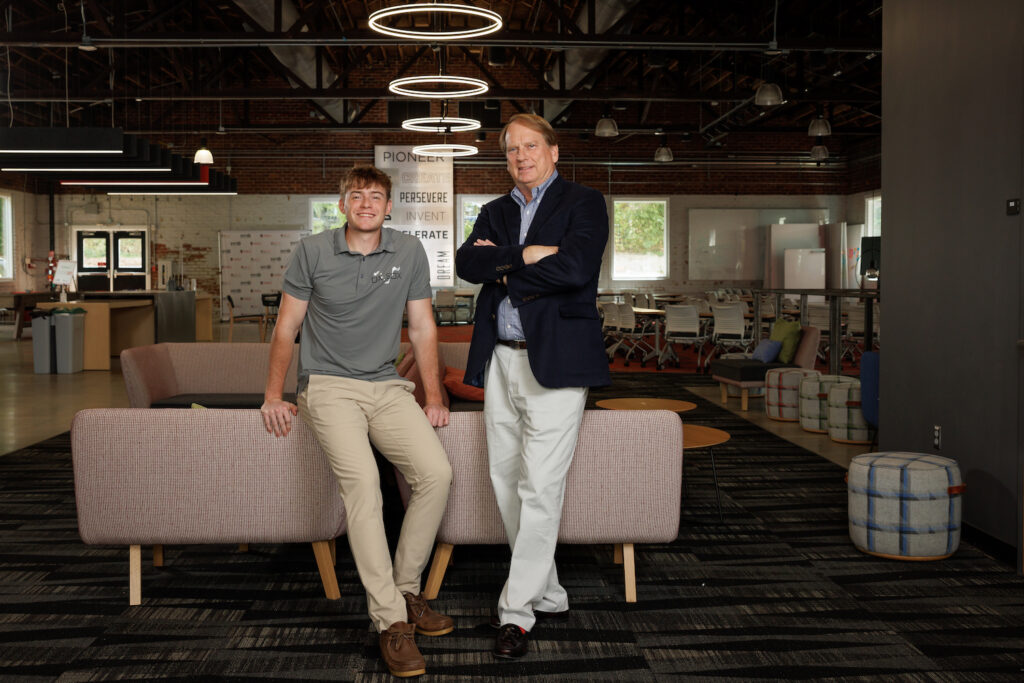
After winning the UGA Idea Accelerator contest last October, Tesvich identified a manufacturer that could make the product, and Ox Sox launched in November. But word had already spread.
“We launched on Nov. 22, and two or three days later we got on the front page of USA Today,” Tesvich recalls. “This was right around Thanksgiving, and I had to miss five days of school because we were so busy packing orders.”
The demand kept up. Tesvich estimates he sold more than 5,000 pairs of socks and grossed more than $75,000 since the company launched last fall. In April he won UGA’s Next Top Entrepreneur competition, besting a group of innovators from around the country to take home the $10,000 top prize.
Tesvich credits the Entrepreneurship Program for his success so far.
“Bob and the rest of the Entrepreneurship team have been fantastic. I owe so much to them,” he says. “My entrepreneurship classes were the most valuable thing I could have taken in college. The lessons we learned were from people who have done it. It’s not out of a textbook. They’re real, applicable lessons.
“The (startup) learning curve is so significant, and it can lead to failure,” he continues. “For someone like Bob to guide you and say, ‘Go this way, not that way’ — it is extremely valuable.”
While he stresses starting a company is not for everyone, Tesvich urges students to consider how their academic pathway lines up with their inner desires.
“It’s so easy to see people getting jobs out of school, doing investment banking, working in consulting,” he says. “You have to detach yourself from that and say, ‘Is that the work-life balance I want? Is that really what I want to do?’ It’s different for everybody, but I knew that’s not what I wanted. So, I chose to focus my time on this. And I think it’s paid off.”
Streamlining e-shipping
Entering the Idea Accelerator her sophomore year, marketing major Valeria Brenner didn’t just want to start a business — she’d already started one.
In high school, she discovered a neat way to make a few bucks: by selling secondhand clothes through an Instagram thrifting account, @Kickin_thrifts. But although it brought in some spending money, she couldn’t quite see the growth potential.
What does a shrewd entrepreneur do in this situation? She pivots.
“Out of curiosity, I started interviewing other thrifting accounts in my community,” says Brenner (BBA ’23). “And I realized there were a lot of inefficiencies in the system — mainly around shipping.”
Brenner’s company, Thryft Ship, creates customized links for Instagram sellers and other small businesses that allow their customers to input address information directly onto a shipping label. Brenner estimates the service trims the average shipping time for 10 packages from two hours to 30 minutes.
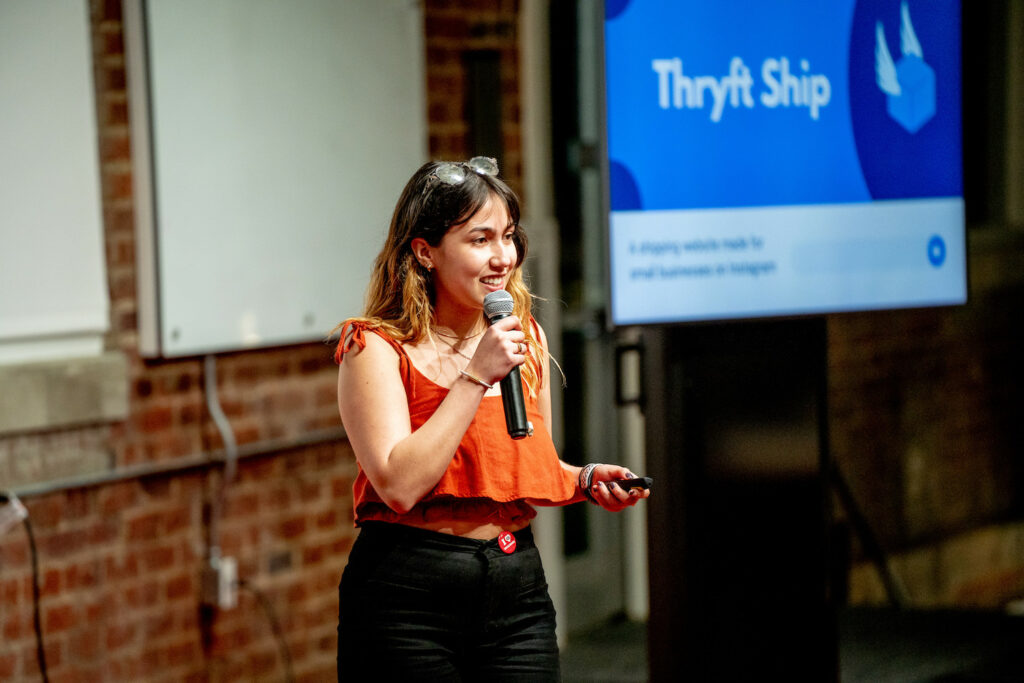
As a product geared largely toward younger users, she says explaining the idea to contest panels of often older judges proved a challenge.
“It took a decent amount of pitches for me to refine it,” she says. “I realized I needed to emphasize the idea of efficiency, time savings and cost savings, and also make sure I explain the marketplace clearly.”
Judges, including those at this year’s Venture Prize Competition, were impressed.
“We felt like you were solving an actual pain point,” Ashley Staggs, senior director of content marketing and operations for Floor & Decor, told Brenner at the contest. “The companies you’re serving are not big enough to play in some spaces. It sounds like you know your customer, and you know how to increase your revenue as you move forward.”
Brenner took the top $10,000 prize at that event and went on to secure a whopping $135,000 at the Rice University Business Plan Competition. Meanwhile, sales are strong. Since launching Thryft Ship in 2021, she grossed more than a half million dollars and helped 1,500 customers ship more than 100,000 packages.
Entrepreneurship Program resources underpin that growth, she says. For instance, lecturer Jim Flannery helped review potential investment contracts and connected Brenner — very much not a coder, she says — to her first web developer, somewhat key to launching an online business.
Entrepreneurship faculty “are 100 percent willing to help you with what you need, as long as you show dedication toward it,” she says.
Brenner is dedicated, and she’s thinking bigger, with plans for a website integration and a packaging partnership, among others, on the horizon.
“I want Thryft Ship to be the place for small businesses,” she says. “I want it to reach beyond shipping. My goal is for it to be a central hub, and as our businesses grow, I want to grow with them.”
Let it grow
Dunning, Tesvich and Brenner are far from the only UGA Entrepreneurship success stories. To name a few:
· Vanessa Sachs (BS ’21, MS ’22) used her biology background to create SWAKE, a fast-growing sweat-proof makeup brand that grossed more than $100,000 in sales in less than two years.
· Spencer Sutlive (BSFCS ’20) raised more than $2 million in venture capital in the year after launching Rugged Road, a line of lightweight coolers.
· Three students banded together to start Offbeat Media Group, an innovative digital marketing firm that was No. 1 on the 2022 Bulldog 100, the annual list of fastest-growing companies owned by UGA alumni.
· In the past year, companies that received funding from the student-managed Georgia Kickstart Fund raised more than $7 million in venture capital.
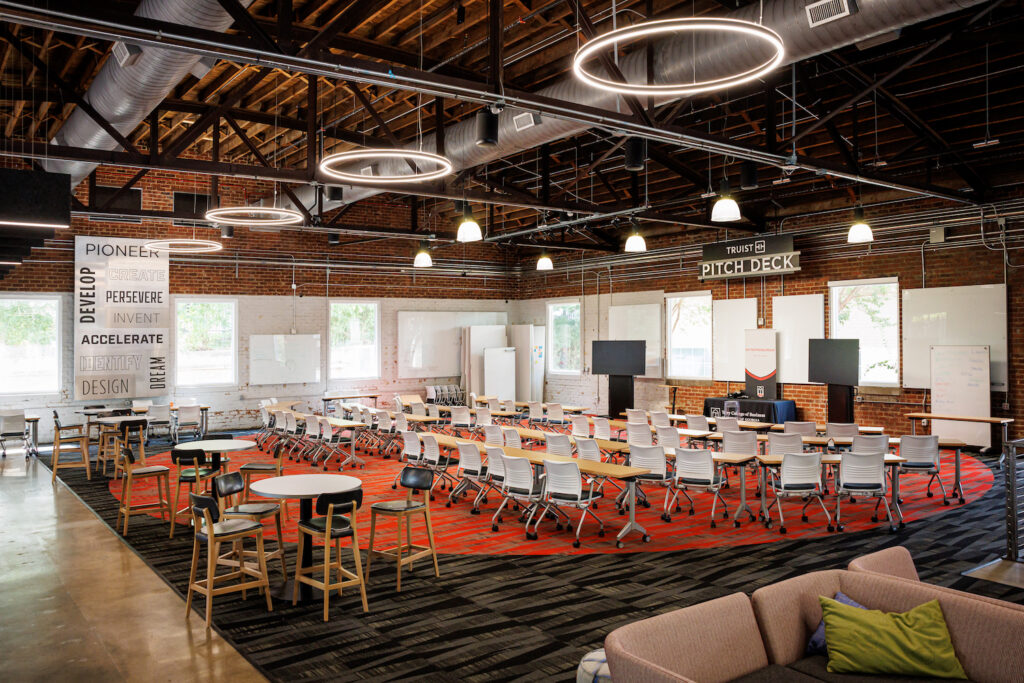
Pinckney cites these pride points, as well as a recent uptick of UGA wins in national pitch contests, as proof the program is fulfilling its mission. “We’re seeing traction being made, and I think that’s validation of what we’re doing and that we’re doing something right.”
But like any good entrepreneur, he keeps an eye on what’s next.
In addition to striving for full program endowment, “we’re constantly looking for new course opportunities,” says Pinckney. “We launched a course on startup investing. We offer a course in franchising, which has been extremely popular. And we’re looking for other opportunities to enhance our offerings.”
These efforts echo the Entrepreneurship Program’s guiding principle, which is to make entrepreneurship accessible to all students — even if those students don’t see themselves as entrepreneurs.
“Most of our students may not ever start a business,” says Pinckney. “My goal is that if they do, they’ll at least have resources to draw upon that can help them have a better chance of being successful.”

